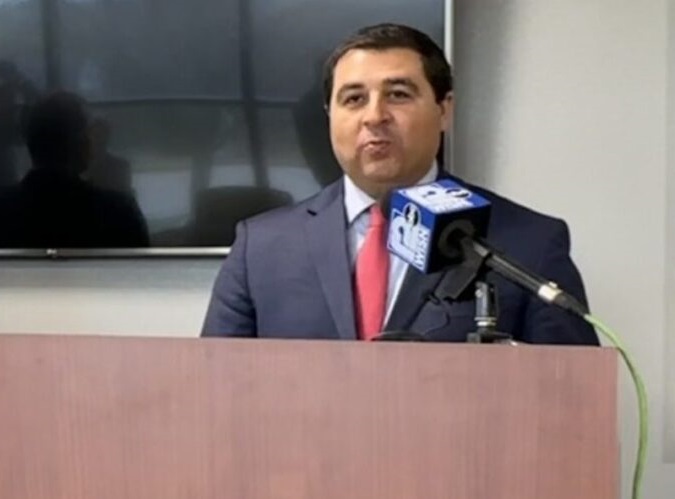Wis. Attorney General leads 17 States urging EPA to finalize proposed PFAS drinking water standards
By: Steve Schuster, [email protected]//June 5, 2023//
Wis. Attorney General leads 17 States urging EPA to finalize proposed PFAS drinking water standards
By: Steve Schuster, [email protected]//June 5, 2023//

By Steve Schuster
As a part of a 17-state coalition, Wisconsin Attorney General Josh Kaul filed comments last week to the U.S. Environmental Protect Agency (EPA) supporting the agency’s proposal to set enforceable drinking water standards for six per- and polyfluoroalkyl substances—more commonly known as PFAS or “forever” chemicals.
“Wisconsinites should be able to feel confident that when they turn on the faucet, the water will be safe to drink,” said Wisconsin Attorney General Josh Kaul.
“National drinking water standards for PFAS would help protect people’s health from the harms caused by forever chemicals,” Kaul added.
In the proposed rule, EPA set Maximum Contaminant Levels (MCL) and Maximum Contaminant Level Goals (MCLG) for six PFAS regularly found in drinking water: PFOA, PFOS, PFHxS, GenX, PFNA, and PFBS.
In Kaul’s comment letter on behalf of the State, support was expressed for (1) EPA’s authority to set the PFAS drinking water standards; (2) EPA’s authority to issue a preliminary determination and simultaneously propose MCLs and MCLGs for PFAS in drinking water; and (3) EPA’s proposed Hazard Index approach to regulate PFHxS, GenX, PFNA, and PFBS individually and as a mixture.
While supportive of the proposed rule, the comment letter also urges EPA to (1) make technical and engineering resources available to public water systems so that the financial burden of removing PFAS does not unfairly fall on ratepayers and customers; (2) finalize the drinking water standards quickly; and (3) consider drinking water standards for other PFAS after finalizing the rule.
PFAS chemicals resist degradation in the environment and accumulate in the body. Those contaminants may be linked to serious adverse health effects in humans and animals. Epidemiologic studies have shown that potential adverse human health effects from exposure to some PFAS include increased serum cholesterol, immune dysregulation, pregnancy-induced hypertension, and kidney and cancer. Exposure to certain types of PFAS is also associated with low birthweight in humans, suppressed immune system response, dyslipidemia, impaired kidney function, among other issues, according to Kaul.
Across the country, PFAS contamination is often found at military bases, firefighting training centers, civilian airports, and industrial facilities. PFAS chemicals tend to be persistent in the environment and have been used for decades as ingredients in firefighting foam and consumer products. Some states with significant PFAS contamination are currently spending a significant amount of money to address the contamination in public drinking water systems, and to investigate numerous areas and sources of potential contamination, Kaul added.
The Attorneys General state in the letter that “[o]ur states face substantial threats to public health and the environment from PFAS” and that “[w]e strongly support EPA’s proposed action to set national standards to protect the public from the harmful health impacts of PFAS in drinking water.”
In addition to Wisconsin Attorney General Kaul, Attorneys General from the following states signed the letter: Arizona, California, Colorado, Connecticut, Delaware, Illinois, Maine, Maryland, Massachusetts, Michigan, New Jersey, New York, North Carolina, Oregon, Pennsylvania, and the District of Columbia.
As previously reported by the Wisconsin Law Journal, Wisconsin Attorney General Josh Kaul filed a lawsuit back in 2022 seeking to force nearly 20 companies that he alleged contaminated the environment with chemicals known as PFAS to reimburse the state for investigations and cleanup work.
The 2022 lawsuit, filed in Dane County Circuit Court, named 18 companies as defendants, including 3M Company, Tyco Fire Products LP, and BASF Corporation. The filing alleged the defendants knew or should have known that their products would have a dangerous effect on the public’s health and environment.
Legal News
- State Bar leaders remain deeply divided over special purpose trust
- Former Wisconsin college chancellor fired over porn career is fighting to keep his faculty post
- Pecker says he pledged to be Trump campaign’s ‘eyes and ears’ during 2016 race
- A conservative quest to limit diversity programs gains momentum in states
- Wisconsin prison inmate pleads not guilty to killing cellmate
- Waukesha man sentenced to 30 years for Sex Trafficking
- 12-year-old shot in Milwaukee Wednesday with ‘serious injuries’
- Milwaukee man convicted of laundering proceeds of business email compromise fraud schemes
- Giuliani, Meadows among 18 indicted in Arizona fake electors case
- Some State Bar diversity participants walk away from program
- Wisconsin court issues arrest warrant ‘in error’ for Minocqua Brewing owner
- Iranian nationals charged cyber campaign targeting U.S. Companies
WLJ People
- Power 30 Personal Injury Attorneys – Russell Nicolet
- Power 30 Personal Injury Attorneys – Benjamin Nicolet
- Power 30 Personal Injury Attorneys – Dustin T. Woehl
- Power 30 Personal Injury Attorneys – Katherine Metzger
- Power 30 Personal Injury Attorneys – Joseph Ryan
- Power 30 Personal Injury Attorneys – James M. Ryan
- Power 30 Personal Injury Attorneys – Dana Wachs
- Power 30 Personal Injury Attorneys – Mark L. Thomsen
- Power 30 Personal Injury Attorneys – Matthew Lein
- Power 30 Personal Injury Attorneys – Jeffrey A. Pitman
- Power 30 Personal Injury Attorneys – William Pemberton
- Power 30 Personal Injury Attorneys – Howard S. Sicula











